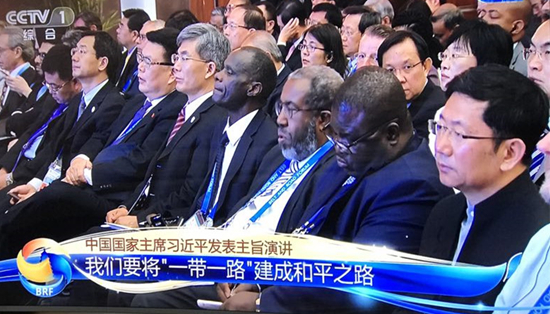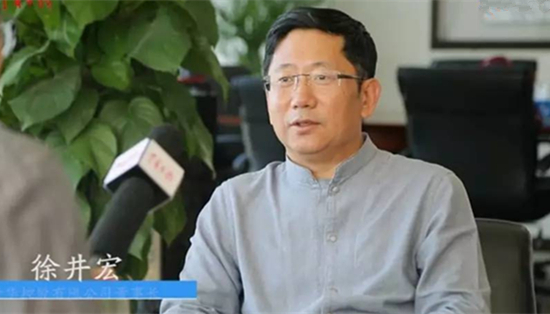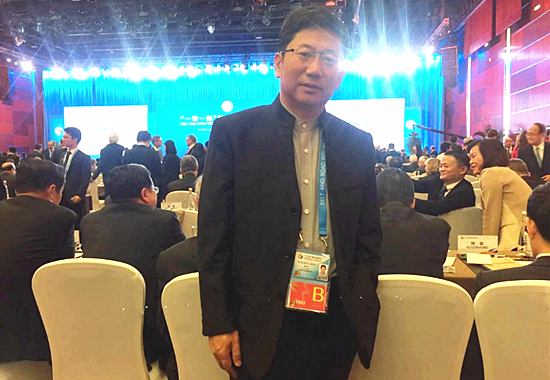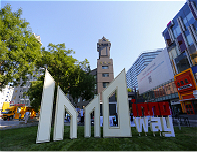Xu Jinghong: Tech firms new driving force for Belt and Road Initiative
2017-05-18
Chinese tech firms will become a new highlight for China's Belt and Road Initiative, said Tsinghua Holdings Chairman Xu Jinghong.
"While in the past international cooperation has mainly focused on developing infrastructure and energy projects, it has become increasingly important for China's tech industry to play a key role in Belt and Road projects," Xu told China Youth Daily before the Belt and Road Forum for International Cooperation, which took place in Beijing May 14-15.

Tsinghua Holdings' Chairman Xu Jinghong participates in the Belt and Road Forum for International Cooperation, which took place in Beijing on May 14-15.
Tech firms should think about how to best serve local markets with their tech strengths in seeking successful globalization, Xu added.
Since the initiative was first proposed in 2013, Chinese firms and entrepreneurs have gained a great amount of experience through the rapid growth in cooperation between governments, academic institutes, and companies.
In recent years, Tsinghua Holdings has provided many successful tech projects for countries along the Belt and Road. One example is the railway inspection system at Terespol, a Polish city that stands on the border of Belarus, developed by Nuctech, Tsinghua Holdings subsidiary.

Xu Jinghong talks about tech companies' development along the Belt and Road during an interview with China Youth Daily.
Nuctech Warsaw, which when built in 2005 was the company's first overseas production base, customized the security scanning system according to the needs of its Polish client. Ninety percent of the company's employees are local and much of the resources used are produced in Europe in Nuctech Warsaw production base.
As one of the largest security inspection devices providers, Nuctech owns more than 3,000 patents in more than 40 countries with the railway inspection system in Terespol acquiring around 200 patents across more than 10 countries.
Given the success of the many China-led tech projects along the Belt and Road, Xu is confident in continued positive development.
"We have become industry leaders in integrated circuits, environmental business, new energy, and biotechnology. We want to increase collaboration with other countries in industry upgrading," said Xu.

Xu Jinghong poses for a photo at the Belt and Road Forum for International Cooperation.
Head of the conglomerate, Xu also foresees a number of challenges facing enterprises as they expand into new markets along the Belt and Road. He believes focusing on local development is the key to further success.
Xu believes collaboration and long-term and reliable service are the key for successful local development, a point he illustrated through Tsinghua Holdings affiliate GSAFETY.
Also known as Beijing Global Safety Technology Co., Ltd, GSAFETY built a public security emergency warning and commanding system ECU911 for Ecuador in 2011. The company provided a three-year follow-up maintenance for the system, upgraded 16 system stations across the country, and trained 2,000 local operating personnel. This showed both the technical proficiency of the company but also its investment in the project on a long term basis.
The system enables local disaster relief agencies to rapidly process information and send out instructions. It helped save many lives from the effects of the 7.8-magnitude earthquake which struck Ecuador on April 16, 2016, and reduced local crime rate by 20 percent, according to the Ecuador government.
Xu said enterprises seeking better localization can form cooperation partnerships with local businesses, which will enable them to achieve win-win development.

 Facebook
Facebook WeiXin
WeiXin CONTACT US
CONTACT US










 Tsinghua Holdings works hard for better ecological environment
Tsinghua Holdings works hard for better ecological environment